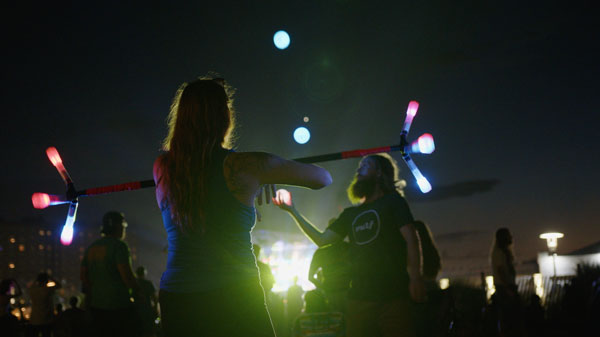
Joshua Kaufman’s Things That Didn’t Happen shows a profoundly disturbed and troubled man getting interrogated about a car accident he is suspected of being involved in. The integration takes place in a retro room, indicated by the colors of the carpet and other decor. However, it is as if the viewer can smell the mildew smell through the lens. The atmosphere of the setting, along with the quiet voices from both the interrogator and the suspect alone, is all due to an overall sense of uncomfortableness throughout the 12-minute short film.
The disturbing nature of the man’s mind is evident throughout the film. The audio is Kubrick-esque and is meant to evoke emotion from the viewer. The goal of uneasiness is also obtained through the ASMR of the man’s actions. For example, as he feels and caresses the light green gelatin mold. We are also exposed to the unbearable nature of the interrogator’s mind, which alludes to this massive sense of guilt. This is most evident when the man is being questioned and grabs onto the plastic sheet of the couch. This plastic couch covering symbolizes a lie and fabrication of what lies beneath, as it covers the truth of what occurred. His guilt and sheet of sanity slip farther and farther away as the film’s plot develops. We sense that this reality isn’t reality as the interrogator begins questioning who he is and why he doesn’t look like the picture shown. The man struggles to grasp reality, as shown when he grabs the blue carpet with his unmanicured toes.
The woodsy scenes are the only scenes where viewers can grasp reality, simply because the man is not a reliable source to comprehend his universe. The green foliage symbolizes hope and revival. The potential to grow from the trauma is not likely in this case for the man. This irony ultimately means there is no turning back from the madness in the protagonist’s mind. As mentioned before, he has been playing with the green gelatin mold. His messing around with the green object symbolizes destroying any chance of revival from his suspected heinous act.
Overall, this film was excellent. The sense of uneasiness that I felt throughout the whole screening was tangible. While I did not necessarily enjoy this experience, it helped me understand the true nature of what someone who is guilty of a crime and who is also not all there mentally is going through. To broadcast one’s state of mind without physically showing what is occurring in his/her mind is a profound talent that is not easy to master. I also truly appreciated the shots of this film, as we NEVER see the interrogator. This symbolizes the encompassing nature of the man’s hallucinations as if the integrator simply does not exist or is only an entity to him. This shot decision also provides the viewer with a POV shot of the man. This is vital to the story’s whole picture because it shows that even though we are exposed to the suspect’s tortured mind, we can also see what he appears to like in the analytical eye of the interrogator. This perspective almost validates whatever conclusion the viewers come to about the man and his crimes because it is framed to confirm our suspicions.










